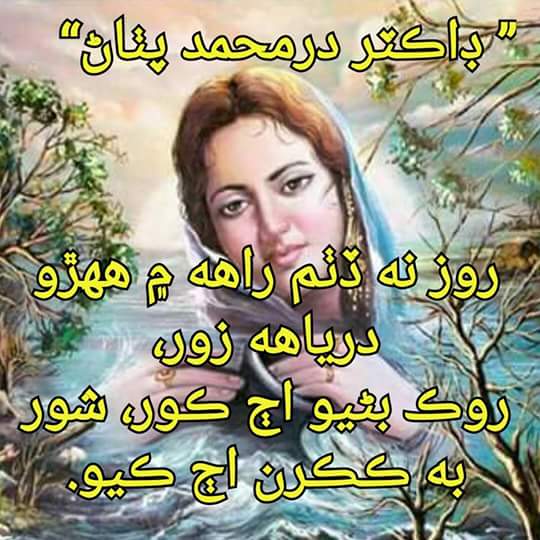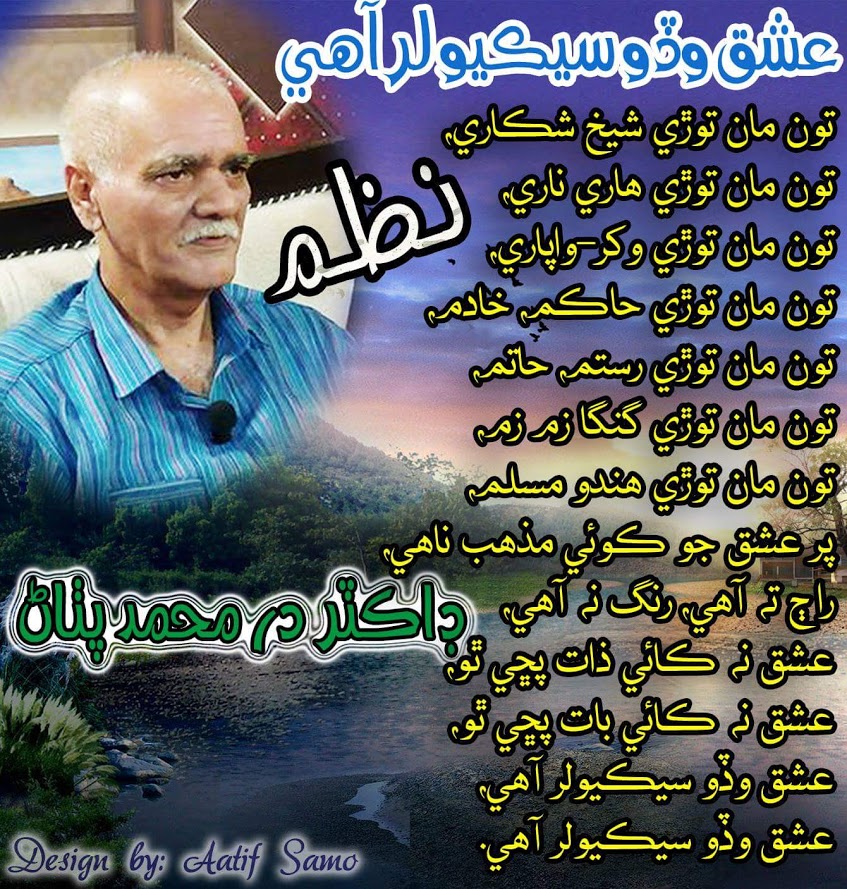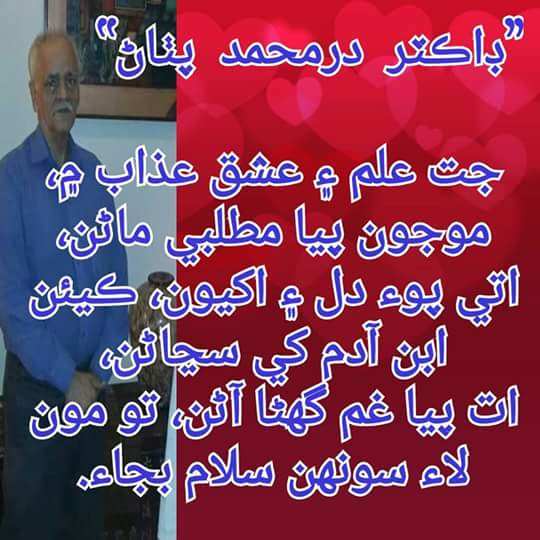6TH SIND PROVINCIAL CONFERENCE
HELD AT JACOBABD (1919)
The first session of the Provincial Conference took place this morning (April 18, 1919) in a large pandal erected for the occasion and lasted for about there hours.
After the singing of a national song, and the reading of letters and telegrams expressing regret at inability to be present, the chairman of the reception committee, Seth Asardes Shewaram, who is a Zamindars and merchant, read his address in which, after welcoming the delegates and thanking the town’s people for the honour done him, he traced the history of the town. Originally it was a small village called Kangarh which came to be called Jacobabad after Jacob Sahib’s arrival. In those days it was the residence and some regiments only, but in course of time, after the constructing of the Kashmore Bund to keep off river floods and the excavation of the Begari and Shahi Canals, extensive cultivation was carried on round about and eventually it became a centre for trade in grains and other produce. The town could boast of two things, the Victoria Tower built to commemorate Queen Victoria and the clock in Jacob’s Residency in which there was an arrangement of the movements of the sun, the moon and the stars. Referring to the Montagu Chelmsford reforms he said that they feel short of the Congress League Scheme and expressed a hope that finally they would take such a shape as to give us cause for believing that they would lead us to self government in the near future. The Rowlatt Bills had been passed in the teeth of opposition from all the Indian members, which had caused wide spread dissatisfaction throughout India. He hoped that better counsels would prevail and the Bills would soon be repealed. Never before within memory had the prices of necessaries run so high, and it was regrettable that not with standing the shortage of foodstuffs in the country the Government had exported large quantities to Africa and some Asian parts. At every conference a resolution in favour of Swadeshi was passed, but it bore no fruit. He hoped that some practical shape would be give to the movement this year so that they might be able to give a better account of themselves year.
He suggested the following reforms to be carried out immediately in Sind: The separation of Judicial and Executive function; the raising of the term of revenue settlements from 20 to 30 years; raising of the term for Nowbat from 5 to 10years; relaxation in the Remission rules by the appointment of a local Advisory Committee whose opinion should carry weight generally in such matters; satisfactory arrangement for the adequate supply of water for the whole year if possible and the appointment of an Advisory Committee of zamindars to make suggestion to the proper distribution of water; abolition of Rasai, Chher and Lapo; the introduction of free compulsory primary education; the opening of a Government High School for the Upper Sind Frontier district; the opening of a College for Upper Sind, to be located at Sukkur; and Repeal of the Arms Act so as to allow every respectable person to carry arms to defend himself from the attacks of dacoits and robbers.
In conclusion he expressed great regret that their Muhammadan brethren were fighting shy of joining their Hindu brethren on political platform. He compared the two communities with the two wheels of a carriage which could not expect to reach its destination if the progress of either of them was retarded. He advised the Muhammadan not to be deceived by the small favors shown them by Government but work in the path of true progress.
Mr. Jamshed N.R. Mehta was then formally elected president. (The Daily Gazette, dated April 22, 1919 Page No. 4).
SECOND SITTING
1. The second sitting of the conference took place this morning (April 19, 1919) and lasted for about four hours. The first and foremost resolution moved was one in the usual terms condemning the Rowlatt legislation. It was moved by Mr. Santdas Mangharam of Hyderabad, who said that Government had leveled a charge against the leaders that they were misrepresenting facts about the Rowlatt Bills. He was there to refute that charge. In all the meetings held in connection with the “Black” Bills he was satisfied that the leaders had tried their best to place all sides of the question before the public. He was followed by Mr. Abdul Rehman of Karachi, Mr. Jethanand of Jacobabad, Mr. Sidhwa of Karachi and Mr. Virooml of Sukkur who supported the resolution which was carried unanimously.
The following resolutions (among others) were also passed after some discussion:
2. “This Conference emphatically protests against the repressive policy of the local government towards the Press in Sind as indicated in other things, by the demand of securities under the Press Act from a large number of Sind newspapers on wholly unjustified grounds, by its order prohibiting registered libraries from subscribing to most of the leading English and Vernacular newspaper of the province and by stopping the publication of Government advertisements and notices in such prescribed newspapers”.
3. “This conference considers it its duty to place before the Government by true sentiments of the Muhammadan of India with regard to the fate of their co-religionists outside India, the question of the Khalifate and of the custody and suzerainty over the holy places such as Mecca, Madina, Jerusalem, Najaf, Kerbella, Kazemain and Baghdad and cordially supports the resolution of the All India Moslem League at the Delhi session in December 1918 on that behalf. “(B) That the British representatives at the Peace Conference will use their influence and see that in the territorial and political redistribution to be made, the fullest consideration will be paid to the requirements of the Islamic laws with regard to the full and independent control by the Sultan of Turkey who is the acknowledged Khalifa of the Prophet over the holy places of Islam above enumerated and over the Tazrutularab as defined in Muslim books”.
4. “This Conference is of opinion that the time has come when steps should be taken to constitute High Court for Sind with the same proportion of Judges recruited from Indians and from the bar as in other High Courts of India”.
5. “This Conference is emphatically of opinion that it is imperatively necessary for the better administration of affairs in Sind that the Vernacular newspapers of Sind should be translated in the office of the Oriental Translator to Government at Bombay and extracts therefore submitted to Government”.
6. “This Conference is strongly of opinion that the Government of Bombay should take steps to start forth with the promised and long delayed High School at Larkana and to establish Government High Schools at Nowshahro at Nawabshah district, at Jacobabad for Upper Sind Frontier district and at Thatta from next year.”
7. “This Conference is of opinion that Sind being mainly an agricultural province steps be taken to open an Agricultural College in Sind”.
8. In the evening a Hindi Conference was held where a resolution in favour of Hindi being taught as the secondary language in all schools was passed. It was also resolved that the municipalities in Sind should be requested to introduce Hindi as the second language, in all schools.
THIRD DAY’S SITTING
To day (April 20, 1919) there were two sittings in the morning and the evening, each lasting over four hours. The morning sitting was held one hour after owing to the pandal having been flooded by heavy rain on the previous night and the evening sitting had to be postponed from 5 to 7 p.m. and was held in the open space of the Dak Bungalow as the pandal grounds were flooded. The morning sitting was attended by about 1,000 persons, of whom about 600 were delegates, 150 members of the reception committee and the rest visitors. The evening sitting was attended by about 3,000 peoples, there being no restriction about tickets.
There was animated discussion on resolutions on Hindu Moslem Unity, the Swadeshi movement, the Rowlatt Bills, Income tax and self determination.
The proceedings of the conference were marked by order and sobriety seldom noticeable at such large gatherings.
The following were among the resolutions passed at the two sitting:-
1. “This conference urges Government to budget adequate funds for the progressive provincialization of roads in Sind, so as to place Sind on a level with the rest of the Presidency in the matter of communications in as brief a period as possible”.
2. “This conference places on record the extreme dissatisfaction of the Zamindars of Sind at the operation of several of the Commissioner’s special circulars, particularly those relating to Follows and remission and requests Government to appoint a mixed committee to enquire into and report on the operation of the special circulars and the necessity and nature of their amendment.”
3. “This conference is emphatically of opinion that in the forthcoming legislation on local self government full popular control should be provided for, in all local self government institutions, entirely free of official control, with wholly elected Boards, completely responsible executive, enlarged functions and increased powers and taxation.”
4. “That in view of the passing of the Rowlatt Act despite united popular opposition this conference expresses sympathy with the Satyagraha movement started by Mahatama Gandhi.
5. “This conference calls upon the Government to publish the report of the committee appointed to enquire into the charges against Muhammad Ali and Shoukat Ali and in view of their extremely protracted interment and the irritable state of public feeling in the country on this account, to order their immediate release”.
6. “This conference further urges that all the Sind internees not yet released should be immediately set free”.
7. “This conference strongly supports the resolution of the Congress for the application of the principles of self determination to India and urges the Prime Minister of England, the Secretary of State for India and Lord Sinha to place this question before the Inter Allied peace Conference and the forthcoming peace Conference and requests the upholders of the principles of self determination at the peace Conference to support the claim of India for the application of the principle as outlined in the resolution of the Congress”.
8. “This Conference urges all the municipalities in Sind to introduce free and compulsory education within their limits,:
9. “This Conference greatly deplores the policy of persecution followed by Government against Lalla Lajpat Rai for a long number of years and strongly urges Government to grant him full freedom of movement and action”.
10. “This conference strongly urges Government the imperative necessity in the interests of the agricultural prosperity of Sind of the early commencement of the Sukkur Barrage and therefore requests Government to press forward the scheme without further delay”.
11. “This Conference strongly condemns the highly unjustified and undignified coercial methods adopted by Mr. Rothfeld, Collector of Sukkur for imposing house tax in Shikarpur despite the protests of the latter and the public and deprecates his action in withdrawing Rs.25,000 from the Municipal funds in an autocratic manner whereby he has placed the Municipality in such a position that it is unable to defray monthly expenses, The Governor of Bombay be approached by a telegram to cancel this unjust order”.
12. “This Conference is of opinion that the present system of control of food and prices in order that it may give real relief to the poor requires improved organization and therefore strongly urges Government to appoint for each district and important city a Committee of Control consisting of representative merchants and the Controller or Assistant Controller and exercising full powers of Control”.
13. “This Conference is of opinion that the newly constituted Municipality of Hyderabad should be given the power of electing its president by a bare majority as is the rule in all major municipalities in Sind”.
14. “This Conference urges the Government of Bombay to commence the work of erecting the public buildings of Karachi during the current year,”
15. “This Conference strongly condemns the action of the local authorities of Karachi in threatening persons who have been residents in British territorial though born in Indian states with removal from British territory if they co operate or participate in the demonstration and functions connected with the Satyagraha and Home Rule movements and urges Government to rescind any orders of removal that may have been issued against such persons.”
16. “This Conference strongly condemns the methods and means adopted by Government officials for imposing house tax in several cities and small towns in Sind despite vehement popular opposition and in direct conflict with the wishes of the people. This Conference further protests against the procedure of establishing notified areas which has as its real object the imposition of house tax.”
17. “This Conference urges on all the communities in Sind the imperative necessity of giving every encouragement to the Swadeshi movement”.
18. “This Conference is of opinion that the present arbitrary system of assessing Income tax results in great hardship on the people and is causing severe discontent in the country and the Conference therefore recommends that a committee of three non officials conversant with the practices and circumstances of each locality should be associated with the assessing officer for the purpose of assessment.”
19. “This Conference expresses its profound gratification at the growing feeling of unity and brotherhood between the Hindu and Muslim communities in India and urges the peoples of Sind to work for the strengthening and perpetuation of this bound of union as it is calculated to foster the growth of common nationhood.”
In the afternoon a Temperance conference was held in the pandal over which Mr. Kishindas Jhamrai, B.A, L.L.B Presided, In his presidential address he discussed at length the evils of drink and suggested legislation prohibiting the use of intoxicating drugs. Failing this he suggested the substitution of Licensing Boards of Abstainers as far as possible on place of the present Advisory Board which should have powers to grant licenses. Resolutions condemning the use of liquor generally and on marriages in particular, appreciating the sacrifice of certain newspapers for foregoing their income from advertisement for liquor, requesting Government to insert lessons on the evils of drink in text books, requesting Government not to allow more than one shop for every 10,000 people, requesting Government to close liquor shop on all holidays, and requesting Government to appoint a Licensing Board of abstainers as far as possible in place of the present Advisory Boards, were passed.
The material/data/information can be provided on request



